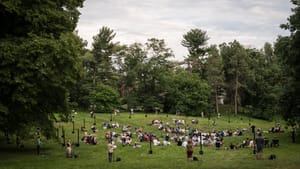Outside singing for inner lives
The Crossing presents ‘Month of Moderns 3: At which point’

As usual, with their choral pulse on the times, Donald Nally and his ensemble The Crossing ended its 2020-21 season in June by returning to their accustomed Month of Moderns concerts. This year they’ve been “singing outside about our inner lives,” wrapping up with three in-person outdoor offerings in evocative Pennsylvania venues (including New Hope’s Bowman’s Hill and The Woodlands in West Philadelphia) that culminated on June 18 and 20 in Germantown’s historic Awbury Arboretum. There, on a hot night in a shady dell, the ensemble presented At which point, an evening of widely divergent contemporary music with two premieres and an expansion of an earlier work.
Circling the top of the sloping meadow, 24 singers were arranged equidistantly surrounding the audience, who sat casually on blankets or lawn chairs. Each singer was connected by their “echoes amplification kits,” a system devised by sound designer Paul Vasquez (with Nally) that allows singers to create synchronized choral music, even when out of sight of one another, while adhering to pandemic-mandated safety protocols.
Ayanna Woods and Wang Lu
The weekend’s a cappella program opened with Shift by Chicago composer Ayanna Woods (b. 1992). This is a double commission, expanded from a shorter work, from November 2020, by the addition of an introductory movement (“Refrain”) to the original section, “Shift.” The piece, which runs less than 10 minutes, opens with sprechtstimme; the men half speak/half sing original text by Woods, under an undulating wave of women’s voices. In the second section, the men take on the ostinato as the women sing above them, asking, “Why do we build monuments in stone?” The work, with its challenging text and mathematical rigor, is surprisingly approachable, its improvisatory aleatoric sections and luminosity underpinning the big questions it asks.
The ensemble then sang the program's title work, a world premiere The Crossing commissioned in 2020. At which point (“for 24 singers and electronic processes”), a three-movement work by Guggenheim fellow Wang Lu (b. 1982), sets poems by writer and performance artist Gander (b. 1956) from Be With, which won the 2019 Pulitzer Prize. The text is knotty, elliptical, often confronting, and the composer tapped into the poems’ hallucinatory, chaotic nature in constructing her composition. After a wordless prologue filled with animal-like sounds (these merged with and were enhanced by the naturalistic setting), the second movement, “Beckoned,” was filled with mysterious and consistent dissonance, echoing the text’s density. Each line of this list poem begins with the phrase “at which point,” and in this movement (and in “The Sounding,” which follows), fleeting moments of elegant melody or harmony are soon subsumed in cacophony.
Highly lauded, Wang writes most frequently for instrumental ensembles, but—as here—her choral music includes a range of effects, spoken and sung. The amplified “electronification” made it challenging to enter into any sonic nuance created by this complex 20-minute work, which would certainly be more encompassing and less aurally confrontational in a concert setting that allowed the resonance of the human voice to take primacy.
David Lang
The concert closed with the US premiere of the sense of senses, a mystical, beautiful, too-brief minimalist work by David Lang (b. 1957), the US premiere of a co-commission by The Crossing, The Company of Music (Vienna), and the Fisher Center (Bard College). The composer adapted his text from the “Song of Songs,” the Biblical source employing sensual imagery to parallel human love with love of God. In his program notes, Lang says that he “filtered out everything except what is heard, felt, smelled or tasted” from the source and “reordered them from far to near”—from sight to sound to smell to feeling to taste—so they intensify throughout the work.
This text is also a list; here, of the joyous things that connect us to ourselves and others. Each incantatory section begins with a phrase delineating one of five senses—“I can see … hear … smell … feel … taste”—calling out things ranging from the ordinary (a door, the garden, apples, shadows) to the mysterious and biblical (ointments, pomegranates, camphire, spikenard). Each “sense section” concludes with a line—“I can hear you” or “I can feel you”—that is triumphantly scored and sung. Lang is a frequent collaborator with The Crossing, and so composer and ensemble know one another’s artistry quite intimately. He writes beautifully for this group, who reciprocate with appreciative and emotional singing, and this work was no exception.
The Crossing comes back
With one break in 2020, the choir has offered its Month of Moderns concerts annually since June 2009, when Nally began the series to highlight the contemporary music among their other offerings. However, as the ensemble continues to win worldwide recognition and Grammy awards for its focus on the work of living composers, every month is really a “month of moderns.” And in the fall, like other ensembles, The Crossing plans to return to former venues and in-person presentations, likely with additions from the new musical paths they’ve trod this year.
Correction: A previous version of this article mis-identified original text by composer Ayanna Woods as written by Martin Luther King Jr.; the composer's original text contains epigraphs by King and Bella BAHHS. We regret the error.
Image description: A photo from a performance of At which point. The audience sits on open grassy ground surrounded by green trees, and the singers form a large circle around the audience.
What, When, Where
Month of Moderns 3: At which point. Ayanna Woods, Shift; Wang Lu, At which point; David Lang, the sense of senses. The Crossing. June 18 and 20, 2021, at Awbury Arboretum, One Awbury Road, Philadelphia. www.crossingchoir.org.
Awbury Arboretum has 56 acres open dawn to dusk every day, with varying levels of accessibility for visitation in differing areas.
Sign up for our newsletter
All of the week's new articles, all in one place. Sign up for the free weekly BSR newsletters, and don't miss a conversation.

 Gail Obenreder
Gail Obenreder